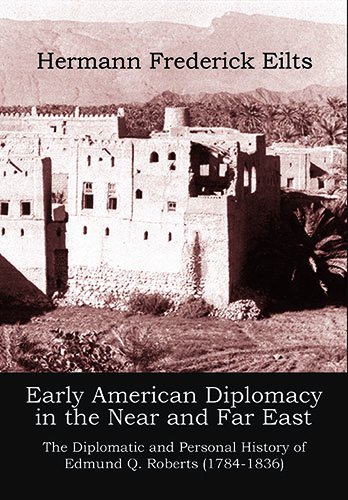
About the Author
Hermann Frederick Eilts was a leading twentieth-century American diplomat and scholar. He had eight postings abroad over the course of three decades, the 1950s–1970s–including Iran, the British colony of Aden, Iraq, Libya, the United Kingdom, and, as U.S. ambassador, to Saudi Arabia and to Egypt. He was intimately involved in drafting and negotiating the Camp David peace accords, which established the first lasting peace between Egypt and Israel since the founding of the Jewish state.
Following his retirement from the Foreign Service, Eilts was appointed a College of Arts and Sciences distinguished professor of international relations at Boston University, where he founded the Center for International Relations and became its first director.
EARLY AMERICAN DIPLOMACY IN THE NEAR AND FAR EAST: The Diplomatic and Personal History of Edmund Q. Roberts (1784-1836)
Hermann F. EiltsNew Academia Publishing, 2012
262 Pages
ISBN 978-0-9860216-5-7 Hardcover
For BULK ORDERS, order directly from New Academia Publishing.
Queries: orders@newacademia.com
About the Author
Hermann Frederick Eilts was a leading twentieth-century American diplomat and scholar. He had eight postings abroad over the course of three decades, the 1950s–1970s–including Iran, the British colony of Aden, Iraq, Libya, the United Kingdom, and, as U.S. ambassador, to Saudi Arabia and to Egypt. He was intimately involved in drafting and negotiating the Camp David peace accords, which established the first lasting peace between Egypt and Israel since the founding of the Jewish state.
Following his retirement from the Foreign Service, Eilts was appointed a College of Arts and Sciences distinguished professor of international relations at Boston University, where he founded the Center for International Relations and became its first director.
About the book
This book traces the remarkable career of a Portsmouth, New Hampshire–born merchant and his efforts on behalf of early American diplomacy with key trading partners in both the Indian Ocean and Southeast Asia. The book recounts the diplomatic and commercial milieu in which Roberts labored, initially as commissioner and later as special agent on behalf of the United States, to pioneer diplomatic dialogue and negotiate commercial treaties with the ruler of Muscat and Oman and with the king of Siam.
Roberts’s experiences in Southeast Asia were particularly instructive for the fledgling American republic and helped establish a protocol and negotiating foundation later employed in the context of further U.S. diplomatic missions to Indian Ocean states and the Far East in general. Moreover his diplomatic efforts and ability to overcome numerous challenges helped set the stage for future U.S. diplomacy in Southeast Asia and the Pacific Ocean region, revealing what American diplomats in the East could expect to encounter on the ground. As such, his American diplomatic successors, though they might not have known it, benefited from Roberts’s experiences, which in turn contributed to the State Department’s growing understanding of what effective American diplomacy in the East required. In the midst of this work, Robert’s ofttimes chaotic and turbulent life played itself out until his death from dysentery in Macao, following his initial unsuccessful attempts to find a way to open up Japan to American commercial and diplomatic interests.
This is a book in the ADST-DACOR Diplomats and Diplomacy Series.
To order from ADST email: admin@adst.org





 Coming Soon
Coming Soon Awards
Awards